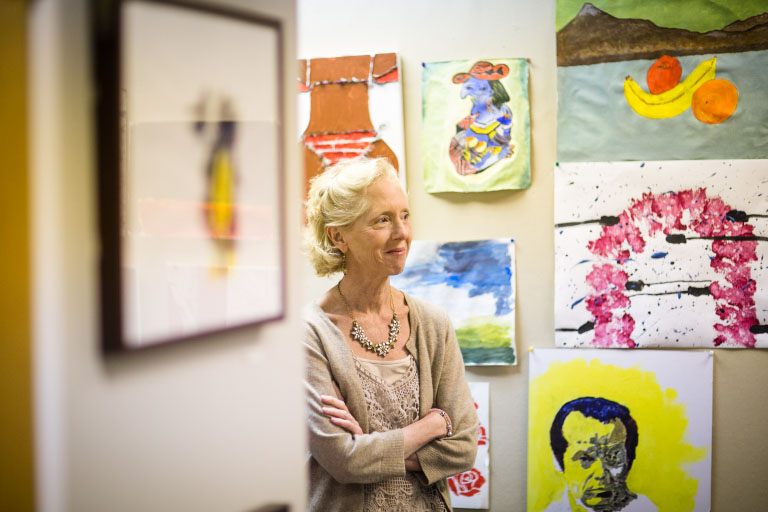
Photo by DAN AGUIRRE
WHEN DORI HUTCHINSON joined BU’s Center for Psychiatric Rehabilitation in 1984, just five years after it was founded by William A. Anthony, her work played a key role in the center’s mission. Hutchinson helped Boston-area adults living with serious mental illnesses to choose, get, and keep meaningful work—a core component in the recovery of people with psychiatric conditions.
Like her mentor Anthony, who was the center’s executive director until 2011, Hutchinson believed that as important as treatment is, people with serious mental illness needed critical skills and support to help them live full lives and participate fully in their communities. “Bill Anthony used to say, ‘A pill doesn’t get someone a job,’” says Hutchinson, a Sargent associate clinical professor. “When you’re diagnosed with a serious mental illness, you often miss out on important life events, like getting your first job or finishing your college degree… [which are] critical skill development opportunities.”
More than three decades after joining the center, Hutchinson stepped into the executive director role in the summer of 2021. She leads a staff of more than 35 and is working to usher the center’s three-pronged approach to psychiatric rehabilitation—research, training, and services—into a new era. Her goals also include continuing the center’s collaboration with Sargent, perhaps by using the center’s research to educate students and faculty on how to support recovery and training graduate students in psychological rehabilitation. “I want to maintain our clarity of focus on all of the innovative and impactful research, training, and services we’ve been doing over the last 40 years,” Hutchinson says. “But I [also] want to expand those opportunities.”
Services, Research, Training
While Hutchinson’s expertise lies in the center’s services arm, which treats some 170 individuals each week who live with conditions like anxiety, trauma, and addiction, she’s also been heavily involved in its other divisions. “I’ve always had a hand in research and training,” she says. “The research at the center inspires innovative [training] and services. Some of our services then become the basis for good research.”
The center’s service offerings have expanded since its inception in 1979. The career education programs that were central at its founding were soon joined by health and wellness services, which focus on an individual’s specific needs, such as sleep hygiene, exercise rhythms that support mental health, or navigating social relationships and difficult conversations. In 1998, the center launched its adult Recovery Education Program, which still runs three semesters a year. The program for Boston-area adults includes an array of classes on topics like yoga and tai chi, executive functioning, cooking, career development, art and music, mindfulness, financial literacy, and peer support. “The idea was that there should be no wrong door to anyone’s recovery,” Hutchinson says. “People get to choose where they want to start in their recovery of their lives.”
Intervening to Prevent Disability
After becoming the center’s director of services in the late 1990s, Hutchinson oversaw its expansion in 2000 to college mental health education services, offered to BU and non-BU students. One service provides coaching to students with serious mental health conditions who want support to return to college or finish a degree. Another program, NITEO, invites college students who have taken a medical leave of absence from any university due to a psychiatric condition to spend a semester at BU.
“It’s a very intensive [early-intervention] program that focuses on building their academic and wellness skills so they can return to college,” Hutchinson says. “We hope to shift the trajectory away from disability because when you don’t have a college degree, that can be a challenge in terms of meaningful career development and employment.”